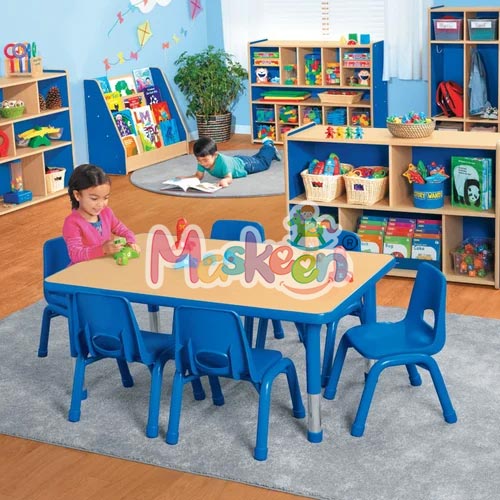- Toys
- Soft Play Equipment
- Trampoline
- School Furniture
- Exhibitions
- Achievements
- New Arrivals
- About Us

Active learning transforms the didactic world into an active experience in which students participate, collaborate, and create rather than passively take in knowledge. However, in many schools, the focus explicitly ignores a very vital subject matter—the physical learning environment. Internationally reputed companies, Maskeen Toys Pvt. Ltd., assert that Classroom Furniture has a direct correlation with the extent of success of the active learning process. The right furniture provides comfort, flexibility, creativity, and student engagement.
For teachers, speaking to students has indeed been difficult due to rigid desks and chairs that do not allow any movement during lessons. By contrast, the active-learning classrooms are built for change and opportunity. In fact, all modern Classroom Furniture Manufacturers design products with a great deal of flexibility in mind. This allows the space to evolve from group and collaborative tasks to individual work and even interactive role-playing.
Active learning exists beyond four walls-in gardens and playgrounds. Recreational areas are extensions of classrooms, where necessary life skills are imparted to children. For example, Installing Outdoor Slides provides outdoor play atop amusement. Children learn turn-taking and social games of their making through patience and resilience. Outdoor play encourages physical activity, enabling students to release pent-up energy and return to grounded work with better concentration. This creates a balance between fun and purposeful learning, wherein learning in classrooms is linked with outdoor play.
Furniture sets the stage for learning; however, one of the indispensable factors, along with furniture for active learning, is the stimulation of all ends upon educational tools. Manipulative resources such as Montessori Toys give an opportunity to children for trial-and-error exploration of concepts, triggering curiosity and problem-solving. These tools are made to render abstract theories into experiences that can be grasped more actively and remembered more vividly. In fact, these flexible learning environments help collaboration and Montessori materials make learning independent for students.
Education can be hard, and children need creative outlets where they can re-energize. Playful structures like an Inflatable Play House will not only get children playing at school. Such equipment teaches flexibility in communication among students, teamwork, and emotional intelligence within a fun and safe environment. By providing spaces where children can refresh their minds, schools ensure that students return to lessons ready to focus. Most importantly, this balance develops active learning strategies by equally maintaining enthusiasm and stamina.
Active learning continues in open areas and activities that physically engage minds. For example, School Slides nurture taking turns, resilience, and problem-solving as children play in fun but structured activities. Such pieces of equipment act as natural classrooms in focusing attention on teaching social and emotional development while having physical activity. A child, through these techniques, not only learns through intellectualism in classrooms but also unfailingly develops all-around resilience, self-efficacy, and social awareness outside of them.
Schools spend millions of dollars on technology and teaching strategies, leaving the most overlooked catalyst of student physical manifestation in their learning spaces. The right classroom furniture can actually be transformed into more than just a piece of furniture into a tool for collaboration, curiosity, and engagement with adequate deliberation. Perhaps this is the missing piece that would elevate ordinary strategies into extraordinary active learning experiences that children will carry with them for life.